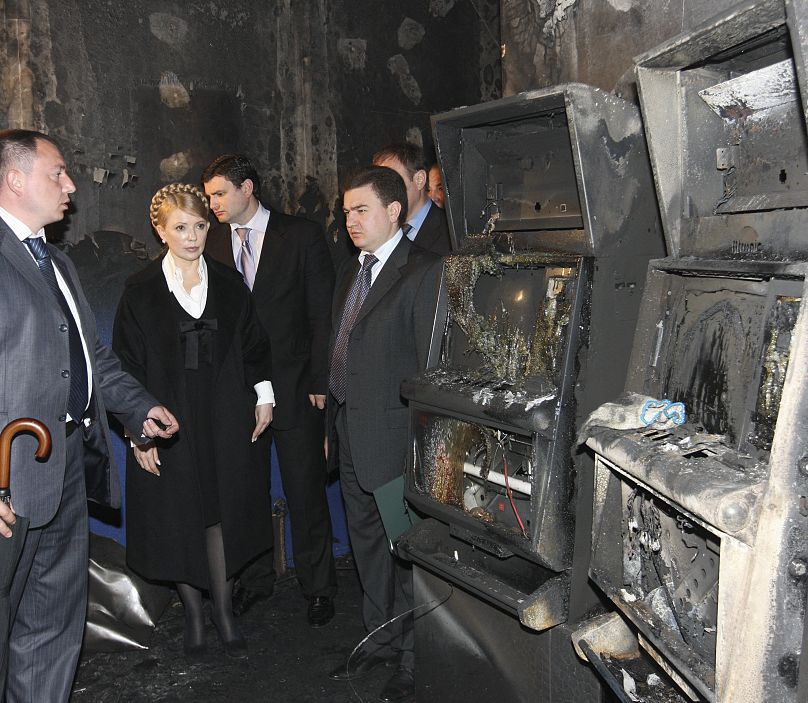Casinos, slot machines and internet betting were banned in Ukraine after a deadly fire at a gaming hall in 2009. More than a decade later, Kyiv is betting big on opening up the market once more.
Football fans had gathered at a gambling hall in the Ukrainian city of Dnipropetrovsk to watch the 2009 Champions League semi-final between Barcelona and Chelsea.
But their evening turned to tragedy when a fire began in one of the dozens of slot machines installed in the arcade.
A lack of fire exits meant people struggled to escape the flames. Nine people were killed and a further 11 injured.
It sparked fundamental change: MPs banned casinos, halls with slot machines, bookmaking shops and internet gambling.
Yet fast forward 12 years and the industry is back. In the year since the sector was liberalised, the government has issued 40 licences.
In the capital Kyiv, betting-related adverts are plastered across billboards, public transport and television screens.
The government is hoping it will boost its coffers: President Volodymyr Zelenskyy has said it could bring in €160 million a year.
'It's a success story for Ukraine'
Anton Kuchukidze, the chairman of the Ukrainian Gambling Council, said the country has the potential to become the biggest gambling market in Eastern Europe.
“The potential here is very high,” Kuchukidze told Euronews. "It is a success story for Ukraine.”
Not everyone is convinced on that last point, but the new law is an improvement on the situation leading up to the 2009 blaze.
“It was awful before 2009," said Kuchukidze. "There was no social protection. Children and gambling addicts had access to the casinos, despite it being under government control. Slots machines were everywhere and the market was de facto not under government control.
“You can say that it was good that the sector was closed in 2009, but what came after was even worse. The market moved into the shadows and worked illegally, while the government received no revenue at all.”
He said illegal gambling halls sprang up, masked as lottery shops, which had been unaffected by the ban.
The new rules, introduced last year, limit who is allowed to open casinos both online and offline. Only certain hotels of a certain standard can open a casino and rules are also in place for preventing access to gambling addicts. The fines for breaking the rules are significant and Kuchukidze is confident it will keep people in check.
Sergey Potapov, CEO of online casino Cosmolot, said he is working with user data to identify early signs of gambling addiction.
“Hopefully, it will make it possible for us to predict who is likely to become addicted and stop it before,” he said.
Illegal gambling halls
Yet despite claims that Ukraine's gambling liberalisation has been a success, the industry still has problems to address.
Potapov, for example, complains taxes are too high and that this is stopping new companies from entering the market.
He said online casinos have to pay an annual fee of €170,000, regardless of their revenue. Gamblers will also have to pay a 19.5% tax on their winnings.
A new law is being discussed, which would substitute the yearly fee for a gross gaming revenue tax rate of 10%.
“We are willing to pay taxes and do so,” said Potapov, “But the tax system will need to change to be competitive to compete with Russia, Belarus, or other countries. I think that many companies are waiting to enter the market until the new law is in place. It is not sustainable as it is right now, and everyone understands that.”
Other critics claim the new legislation is not being implemented properly, pointing to the illegal gambling halls still operating in Ukraine.
In addition, Ukrainian police recently also arrested a member of Ukraine’s Gambling and Lottery Regulatory Commission on suspicion of taking a bribe of $90,000 to grant a gambling licence.
Kuchukidze said he was working with police to shut down the illegal gambling halls and that a new tax framework is on its way to help the sector.
“More than ten foreign companies have demonstrated their interest in the Ukrainian gambling market when the tax draft passed its first reading,” he said. “And I think that when it is adopted, we will see more investors in Ukraine, and it is natural because Ukraine is the biggest gambling market in Europe and we will see that later.”
Every weekday, Uncovering Europe brings you a European story that goes beyond the headlines. Download the Euronews app to get a daily alert for this and other breaking news notifications. It's available on Apple and Android devices.












